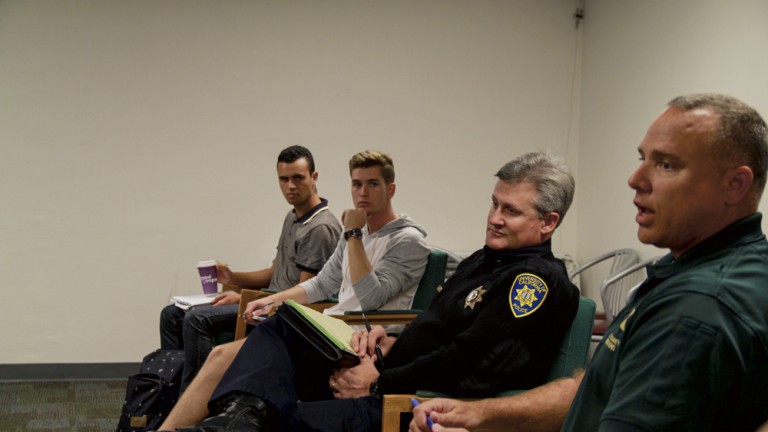
Hector Sanchez Castaneda
Isla Vista Beat Reporter
The Isla Vista Community Services District (CSD) has the power to contract with the Santa Barbara County Sheriff’s Office (SBCSO), the Regents of the University of California or both to increase law enforcement presence in I.V. During their police-oriented meeting on Tues., Feb. 23, community stakeholders met with the I.V. Foot Patrol (IVFP) Station Lieutenant Rob Plastino and UC Police Department Lieutenant Mark Signa to go over their options.
Past conversations have touched on the possibility of expanding UCSB’s Community Service Organization (CSO) program to I.V. under a structure akin to the San Luis Obispo Police Department’s Student Neighborhood Assistance Program (SNAP), according to Darcel Elliott, district director for the Office of Assemblymember Das Williams. SNAP students have the power to issue formal warnings that, if disregarded, lead to citations from the SLOPD, according to Mustang News.
However, the university was hesitant to have students serve a population other than UCSB students, so stakeholders focused on possibly contracting with the sheriff’s office instead. Currently, the plan is for the sheriff’s office to hire cadets, university students or interested parties who would focus on community relations instead of policing.
“These people would not … have a weapon,” Elliott said. “They’re not sworn officers. They wouldn’t have the ability to make arrests … They would be responding to the lowest [priority] calls … and they would free up the IVFP officers to handle bigger issues and things.”
Plastino expressed his support for the program and its potential, and said that the SBCSO is willing to participate with the CSD if voters approve it in the upcoming November ballot.
“[This program] has been something that I’ve wanted for a long time, and I’ve seen the positive influences that, for example, UCIV has had during our major events,” Plastino said, referring to the volunteer program that tries to act as liaisons between the community and police. “Having that effort here in I.V., I think is going to be a real success. I think it’s going to be a positive thing for law enforcement because we’re not seen as just the bad guy that’s coming in to [say], ‘Here, here’s your ticket, zero tolerance,’ and more of like, ‘Hey, we’re part of this community too … here’s a warning.’”
The current CSD services proposal draft allocates $75,000 annually to the I.V. cadet program, and includes the payment for one coordinator and six non-sworn officers. This amount is still being negotiated since other factors, such as wage — which they determined should be $15 an hour— and whether or not current IVFP Community Resource Deputy James McKarrell could serve as the coordinator, are being considered.
It is still not clear how many people the cadet program would hire. Stakeholders are dubious as to the specific tasks program participants would have and believe that the number hired will depend on the final job description they establish.
“It depends on what your goal is going to be,” Signa said. “They’re going to be out there giving warnings, that’s great. That’ll be helpful; it’s a great service to do. But to be highly visible, you need a large number. If you’re dealing with a Friday or Saturday night crowd in Isla Vista, of let’s say 10,000 people — four, five, six, of the cadets are going to blend right in and not be visible.”
Signa also asked what equipment these officers would hold. It is still not clear if they would carry radios for communication or bicycles to navigate I.V.
Third-year history of public policy major and External Vice President for Local Affairs Paola Dela Cruz brought up the question of who would be eligible to participate in the cadet program, whether it would be only students or any interested member. SNAP, for instance, exclusively hires students from the local colleges.
“From the sheriff’s department’s perspective, we wouldn’t want to exclude anybody,” Plastino responded. “So anyone that wanted to apply for the position certainly could.”
In past meetings, stakeholders said they were interested in giving ticketing powers to people in the cadet program in order to help with the parking situation in I.V. Cameron Schunk, field representative for Williams’ office, said that SNAP officers are able to issue parking citations. Plastino, however, did not fully agree with this power.
“We have a parking enforcement officer already,” Plastino said. “I would advise against [giving ticketing powers]. I would say that their job is to liaison to the community outside of writing citations, which is what we got law enforcement and parking enforcement for. We would differ from the [SNAP] program in that regard.”
Stakeholders also mentioned that they wanted participants of the program to be able to report infrastructure deficiencies — like broken lights — and help people contact CSOs during busy weekend nights.










